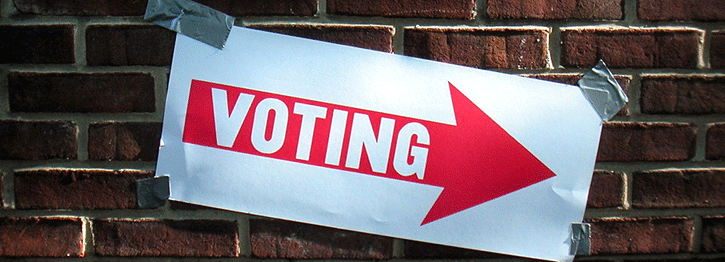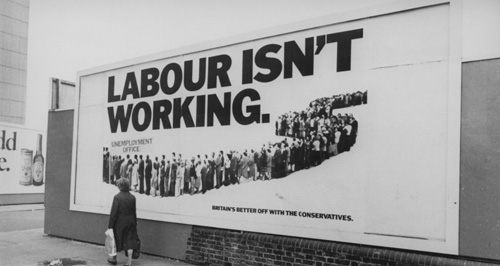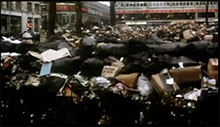 In the lead up to the 2015 General Election, we're launching our #79Rewind campaign via The Open University Twitter account. Each week, we'll be tweeting key milestones from the 1979 election campaign that correspond with the 2015 election countdown.
In the lead up to the 2015 General Election, we're launching our #79Rewind campaign via The Open University Twitter account. Each week, we'll be tweeting key milestones from the 1979 election campaign that correspond with the 2015 election countdown.
Here on OpenLearn, you'll find a wealth of content from our academics comparing and contrasting the two events as well as some interesting archive materials. Anyone fancy reading Thatcher's beauty tips, for example? Or have any of the structural economic problems faced by the UK back in 1979 been resolved?
We'll be delving into the Winter of Discontent and discovering which MPs defected; exploring the state of the NHS and seeing which politicians played the right games among many more topics.
Check back every week for content under our 'Countdown' heading below, and follow our campaign on Twitter using the #79Rewind hashtag. Make use of our comments facility too by sharing your views: how much do you think the two election campaigns and the contexts against which they played out differ or seem to be the same?
Countdown:
1 day: Tories won 1979 election with 43 seat majority. Jeremy Thorpe, leader of Liberal Party, lost his seat. And so our #79Rewind campaign comes to an end! If it's piqued your interest in politics, treat yourself to some free learning.
Try one of our free open courses:
- Political Ordering
- Nationalism, self-determination and secession
- Rights and justice in international relations
- The USA, power and international order: Foreign policy under Obama
- Politics, media and war: 9/11 and its aftermaths
- Welfare reconstruction
2 days: Step back in time and see BBC 1979 election coverage:
4 days: 1979 NOP poll published in Daily Mail put Labour slightly ahead for 1st time in election campaign.
- Listen to our podcast 'Pitfalls of Polls'
- Find out what happens when polls collide
7 days: Teachers go Tory as '79 NOP poll showed 52% of sample supported Thatcher.
- Dr Frank Monaghan discusses Education and the General Election of 1979
- Alan Shipman explains how Teachers were not the only unionised, previously Labour-loyal employees who were switching towards the Conservatives in 1979
9 days: 1979 Tory lead dropped by 7% in 7 days according to poll conducted for The Observer
- Find out more about opinion polls with these short videos 'Opinion polls in a nutshell'
11 days: Ipsos MORI poll found Callaghan was preferred as PM over Thatcher.
- Is democracy always a good thing? Professor Derek Matravers discusses.
12 days: Tory election broadcast aired in 1979 using the Sun's headline "Crisis? What Crisis?".
- Read Alan Shipman’s article - 'Chaos' became 'crisis' - but was the reality so bad?
14 days: Cardiff SE Lib candidate pulled out of '79 election, urging people to vote Tory.
15 days: PM Callaghan claimed credit for fall in unemployment in '79 election broadcast.
17 days: Liberal leader David Steel accused of being 'illiberal' at '79 Young Liberal conference.
19 days: Thatcher bids farewell to the middle way with 'this is my faith and my vision' speech in Cardiff.
- Read the speech here, and see how the news covered it.
- Learn the art of speech making by taking a free course in speeches and speech-making
- Find out what makes a great speech by exploring this iTunesU collection.
20 days: Thatcher ruled out Lib-Con coalition or pact if she did not have an overall majority in 1979
24 days: This time on the 1979 election timeline, the Tories published their manifesto.
25 days: Liberals published 1979 manifesto with focus on electoral reform, tax cuts and a new look at devolution
- Read Liberal Democrats' 1979 manifesto here
- Read how Liberals saw their chance to build on an abandoned middle ground
28 days: PM Callaghan said Tories would turn British regions into 'deserts of unemployment' if in power and Heath accused Labour of 'lying its way back into office' in 1974 with 'dishonest slogans'.
- In a democracy, has the public created a demand for politicians to perform - and does that mean we can't trust them? Mike Saward and guests consider this in Performing Politics: perspectives -
If there is anyone out there…
MICHAEL SAWARD
Barack Obama
.
BARACK OBAMA
…who still doubts that America is a place where all things are possible…
MICHAEL SAWARD
Many writers have described him as the greatest orator of his generation.
BARACK OBAMA
…who still wonders if the dream of our founders is alive in our time…
MICHAEL SAWARD
He’s a politician who really knows how to appeal to his audience.
BARACK OBAMA
…who still questions the power of our democracy…
MICHAEL SAWARD
I’m Professor Michael Saward and in this podcast I’ll be examining how and why politicians have to perform.
BARACK OBAMA
… tonight is your answer.
[Cheers]
MICHAEL SAWARD
Politics without performance may be no politics at all – just routine administration and backroom deals.
Politicians have to appeal to a wide range of groups. And a good performance – one that looks good, sounds good, is convincing – can be crucial to convey that appeal.
Oscar winning actor and politician Glenda Jackson believes all the world is a stage for today’s political leaders:
GLENDA JACKSON
Obama clearly struck a chord, not only in America, but around the world.I mean that was something that people had been wanting to hear for a very, very long time - the capacity, the ability to connect .And to connect with individuals, even though those individuals are standing in crowds of hundreds of thousands.
MICHAEL SAWARD
We expect our politicians to perform well - even if we complain about the fact that they may sometimes be 'acting'. There’s a huge pressure on politicians to be good performers. And, as author Pauline Melville explained to Evan Davies on Radio Four’s Today programme recently, there’s a long history of politicians being trained.
Margaret Thatcher had voice lessons… People can be taught to mirror their clients’ body language, to look empathetic or to have power walking.
EVAN DAVIS
Power walking?
PAULINE MELVILLE
Yes, walk with confidence to present themselves with confidence. Actually that reminds me of seeing Blair and Bush power walking towards the podium to talk about the Iraq War. You know you wonder if they’d learned…
EVAN DAVIS
They’d been taught how to power walk?
PAULINE MELVILLE
Yes.
MICHAEL SAWARD
All this effort put into performing well may reflect the fact that images are now so powerful in our culture now that acting establishes what counts as 'real'.
Parliamentary Sketch writer and theatre critic Quentin Letts:
QUENTIN LETTS
The greatest example of acting British politics in the last 100 years or so, Winston Churchill.
Those speeches during the war, Britain was really up against it, we were not winning the war at the time, and yet Churchill presented this bulldog character which was very much at odds with his personal character -- he was a drunk, he was a … he was a difficult tortured, complex man, and yet he presented this image of the bulldog.
And that was a wonderful bit of acting; and that was an example about how acting could really help the national cause. So, you know, it’s too glib just to say 'acting is bad in politics'. Acting can be essential.
MICHAEL SAWARD
So acting in politics is not lying – it might be, sometimes, but the connection is not that common, and certainly it’s not automatic.
Politicians have to gather information on issues and to negotiate competing values. They can’t do these things if they are totally open about what they think at all times. Not being precise, or not giving everything away at once, is not lying – it is just being careful, being 'politic', often for good reasons.
This is not an easy role, and putting on a good performance, one conveying sincerity and authenticity, is crucial to success.
Sometimes 'lying' is not knowing. Or not knowing enough; sometimes it is strategic openness to the future.
Sometimes, of course, truth, lies and performance are connected. Performances that try to gloss over or avoid truths are common enough.
And who can blame politicians- if they get caught out it can be embarrassing to say the least.
BILL CLINTONI did have a relationship with Miss Lewinsky that was not appropriate. In fact, it was wrong. I misled people, including even my wife. I deeply regret that.
MICHAEL SAWARD
President Bill Clinton finally admitting an affair with Monica Lewinsky.
In a democracy, politics has to be seen to be done. It has to be performed, staged, scripted. If it wasn’t, as citizens, we might not have a clue what’s going on.
Democracy needs effective engagement and communication. Quentin Letts:
QUENTIN LETTS
Well I think the problem with this whole issue is that we, the voters, are terrible hypocrites.
We say we don’t like actors in our politics, and yet, when the politicians don’t act, they don’t get so many votes.
So we as an electorate have to sort out our attitude to this. And I think the honest answer is that they need to do a bit of acting - but they probably have been overdoing it recently.
MICHAEL SAWARD
Performances create democratic politics. Performances create audiences – citizens who pay attention. But can’t we have authentic leaders? What is authentic? We shouldn’t confuse truthful content with an authentic person.
Authentic can mean a strong sense that they are genuinely grappling with the issues – even if they are 'acting', and even if they are not yet telling us everything.
There is always the frontstage politician on show for the media and the backstage one. Do we really want to collapse the two?
Quentin Letts thinks that sometimes being a good performer will never be enough.
QUENTIN LETTS
If you get the policy right, then you’ve got to find the personality and the promotional skills to punt it up field. So you’ve got to have the base camp of the policy and you’ve got to have worked out your philosophy.
A great performance without that policy is absolutely pointless.
Paddy Ashdown was in some respects a really good performer, politically. He was good at sound bites; he looked good; ex-Army man, he had a great back story; had hopeless policies and it was never going to work.
MICHAEL SAWARD
Perhaps as voters we’re accepting stage managed politics and we want good, justified performances. Glenda Jackson agrees.
GLENDA JACKSON
I do sometimes sit and fulminate when I’m watching either PMQs or questions to Ministers, MPs stand up and they haven’t rehearsed their question, and there’s a kind of lot of humming and ahhing and taking ages to get to the point.
MICHAEL SAWARD
So what is a citizen to do? Quentin Letts thinks we the voters should become critics of the political theatre.
QUENTIN LETTS
We’re now pretty sophisticated about the way that we look at politics.
If we look at a TV debate, we know that they’ve all been prepping like made; we know that they’re trying not to make a mistake.
If we look at political events on television, we know that there is a certain amount of fraudery involved, and yet we somehow discount that and we buy into it because we realise that they’ve got to have some way of establishing their platform.
MICHAEL SAWARD
As citizens we need to judge those political performances that are timely and justified, and those that are not.It’s not about getting upset because politicians act.It’s about how justified that act is, and who and what it is aimed at.
Performing Politics was an Open Politics podcast produced by the Open University. You can watch the accompanying video or listen to more politics podcasts at www.open2.net/politics
29 days: Labour Party manifesto was released under 'The Labour way is the better way' strapline.
- Read Labour's 1979 manifesto
- Read about how Labour paid the price for a decade of economic derailment
32 days: Dennis Healey delivered a 'Caretaker Budget' framed with the co-operation of the Conservatives.
36 days: Saatchi & Saatchi 'Labour isn't working' campaign relaunched by Tories.

37 days: Callaghan announced 3 May election, asking party to resist personal campaign against Thatcher.
- Do we want politicians or do we really want performers instead? Watch our video Performing Politics where we consider if we are putting artifice ahead of substance.
- Read more about Callaghan vetoing abuse of Thatcher
38 days: Callaghan lost vote of no confidence by 1 vote, forcing him to call General Election
- Read Alan Shipman’s article on how the economic problems of 1979 were buried, not resolved.
- Listen to Foot's finest hour - Labour government, again facing a confidence vote, fielded Commons Leader Michael Foot to wrap up the debate and make a last gasp pitch for the support of wavering MPs.
43 days: Thatcher set the ball rolling on no-confidence motion back in 1979. Find out why the events of the 1979 Winter of Discontent went down in political folklore by watching our video below by Dr Richard Heffernan:
44 days: Callaghan delivered statement in the House of Commons about rescuing Scottish devolution.
- Gerry Mooney argues that the 1979 Scottish Devolution Referendum set in motion political shifts that are still playing-out today in his article 1979: The First Scottish Referendum on Devolution.
- The 1979 General Election in Scotland: A Highpoint for Thatcher and the Tories?
49 days: Strike suspended at Britain's largest blood transfusion unit due to acute shortage of blood.
50 days: Thatcher revealed her special beauty tips in interview for The Sun in 1979.
- Read the interview with Margaret Thatcher.
- Watch a short video on Performing Politics below and listen to the audio feature Performing Politics: The full story
51 days: PM Callaghan admitted to Commons that inflation is to move back into double figures.
- Why do economies go into recession, and what should policymakers do? How do governments use money to influence the economy? Listen to this podcast to find out.
- A pre-election rise in interest rates would confirm Britain’s economic recovery. And might also sink it, writes Alan Shipman in this Society Matters article.
- Each year, the Office of National Statistics tweaks the contents of the baskets used to track inflation. What gets added or dropped tells how our tastes and habits change as a nation. Read this article to see a comparison of 2004-2014.
- Learn about the Phillips' Curve in by watching this animation below - 60 Second Adventures in Economics - The Phillips Curve. You can download this entire series for free from iTunesU.
56 days: Thatcher pledged more defence spending during her speech at this point of '79 election countdown.
65 days: This time on '79 election countdown, Scottish and Welsh devolution referendum results were announced.
- How do they compare to now? Compare the 1979 results with the 2014 results.
- Study this free course on devolution.
- In this video, Professor Richard Wyn Jones of the Wales Governance Centre talks to Professor Linda Colley of Princeton University about her book 'Acts of Union and Disunion' and the wider issues of the union of the United Kingdom, national identity and devolution. This event was hosted by The Open University in Wales in partnership with Cardiff University's Wales Governance Centre in March 2014.
66 days: It was announced 29,474,000 working days were lost to strike action during the winter. Hear Open University Reader in Government Richard Heffernan talk about the Winter of Discontent in this short video.
68 days: This time in 1979, there was a landslide Liberal victory in Liverpool Edge Hill by-election.
74 days: Teachers in England and Wales submit pay claim of 36.5 per cent.
80 days: 'Saint Valentine's Day Concordat' marked end to 1979 Winter of Discontent. What led up to this period of strife? Read this article about strike action during the time.
- Find out more about the pitfalls of polls in this podcast.
- Can opinion polls really predict the future? Listen to this discussion between politics academics.
- What about the technical side? Read this article to find out about the murky world of opinion polls
82 days: The Guardian reported Welsh Assembly would cost less than underground car park for Westminster MPs (and in Welsh: Adroddodd y Guardian y byddai’r Cynulliad yn rhatach na maes parcio tanddaear i ASau San Steffan). To find out more about the long road to Welsh devolution, try this free course on OpenLearn Cymru.
83 days: Chairman of Volunteer Centre criticised Tory plans to rally ‘mass voluntary service’ to deal with future economic crisis.
85 days: TUC and government talks on new social pact made ‘good progress’ this time on 1979 election countdown.
 90 days: Rubbish piled up during dustmen's strike this time in 1979. Discover more about how this happened in this short video.
90 days: Rubbish piled up during dustmen's strike this time in 1979. Discover more about how this happened in this short video.- Want to learn more about politics? Try a free course in political ordering.
- If you like what you try, discover which courses The Open University offers in politics via the course website.
Rate and Review
Rate this activity
Review this activity
Log into OpenLearn to leave reviews and join in the conversation.
Activity reviews